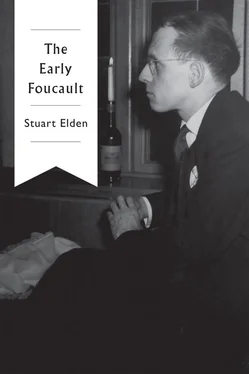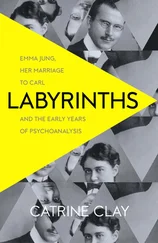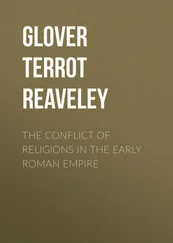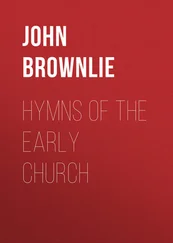3 3. Claude Mauriac, Les Temps accompli, Paris: Bernard Grasset, 1991, 43.
4 4. Michel Foucault, Les Aveux de la chair, ed. Frédéric Gros, Paris: Gallimard, 2018. See Stuart Elden, ‘Foucault’s Confessions of the Flesh’, Theory, Culture and Society, 35 (7–8), 2018, 293–311.
5 5. On working with this archive, see Samantha Saïdi, Jean-François Bert, Philippe Artières, ‘Archives d’un lecteur philosophe: Le traitement numérique des notes de lecture de Michel Foucault’, in Franz Fischer, Christiane Fritze, Georg Vogeler (eds), Kodikologie und Paläographie im digitalen Zeitalter 2, Norderstelt: BoD, 2010, 375–95; Philippe Artières, Jean-François Bert, Pascal Michon, Mathieu Potte-Bonneville and Judith Revel, ‘Dans l’atelier Foucault’, in Christian Jacob (ed.), Les Lieux de savoir 2: Les Mains de l’intellect, Paris: Albin Michel, 2011, 944–62; and Marie-Laure Massot, Arianna Sforzini, Vincent Ventresque, ‘Transcribing Foucault’s Handwriting with Transkribus’, Journal of Data Mining and Digital Humanities, 2019, https://jdmdh.episciences.org/5218
6 6. Stuart Elden, Foucault’s Last Decade, Cambridge: Polity, 2016; Foucault: The Birth of Power, Cambridge: Polity, 2017.
7 7. James Miller, The Passions of Michel Foucault, London: HarperCollins, 1993, 404 n. 82. For an earlier study of this period see José Luis Moreno Pestaña, En devenant Foucault: Sociogénèse d’un grande philosophe, trans. Philippe Hunt, Broissieux: Croquant, 2006. This was written without access to the posthumous publications or the archival material utilized in this book.
8 8. Claude Mauriac, Le Temps immobile 3: Et comme l’espérance est violente, Paris: Grasset, 1986 [1976], 341–2; Le Temps immobile 9: Mauriac et fils, Paris: Grasset, 1986, 291.
9 9. See Didier Eribon, Michel Foucault, Paris: Flammarion, 3rd edn, 2011, 95–8; Michel Foucault, trans. Betsy Wing, London: Faber, 1991, 54–6 (hereafter French and English are cited separated by /); Macey, The Lives of Michel Foucault, 41–2. Eribon’s third edition is updated; the English translation is of the first edition. I will occasionally make reference to the first and second French editions.
10 10. C 18/18; Eribon, Michel Foucault, 98/55–6.
11 11. Philippe Artières, ‘Un Frère: Entretien avec Denys Foucault’, CH 35; Artières et al., LMD 8/vii.
12 12. Paul Foucault, Titres et travaux scientifiques, Poitiers: Imprimerie du Poitou, 1926.
13 13. DE#20 I, 293–325; EW II 103–22; Folie, Langage, Littérature, ed. Henri-Paul Fruchaud, Daniele Lorenzini and Judith Revel, Paris: Vrin, 2019, 265–86, 287–304.
14 14. These texts mainly appear in DE I, with some translated in EW II. See also DL, Folie, Langage, Littérature, and LMD. They will be fully discussed in The Archaeology of Foucault.
15 15. See Elden, Foucault’s Last Decade, 114.
16 16. Eribon, Michel Foucault, 73/40; see Macey, The Lives of Michel Foucault, 49.
17 17. Artières et al. ‘Dans l’atelier Foucault’, 954.
18 18. The Bastille archives were used for a project envisioned from the late 1950s, but not finally published until 1982. Arlette Farge and Michel Foucault, Le Désordre des familles: Lettres de cachet des Archives de la Bastille au XVIIIe siècle, Paris: Julliard/Gallimard, 1982; Disorderly Families: Infamous Letters from the Bastille Archives, ed. Nancy Luxon, trans. Thomas Scott-Railton, Minneapolis: University of Minnesota Press, 2017. See Elden, Foucault’s Last Decade, 192–4; and Nancy Luxon (ed.), Archives of Infamy: Foucault on State Power in the Lives of Ordinary Citizens, Minnesota: University of Minnesota Press, 2019.
19 19. See Elden, Foucault’s Last Decade, 207–8.
1 Studying Philosophy and Psychology in Paris
Foucault moved to the Lycée Henri-IV in Paris in 1945 shortly after the war ended, where he was briefly taught by Hyppolite. Foucault studied philosophy, history and literature in French, German, English, Latin and Greek, reading widely in classical texts. This was the khâgne class to prepare for the concours entrance exam for the ENS. Foucault had failed that exam in 1945 while still studying in Poitiers, but passed in 1946. 1He had also support from Maurice Rat, a family friend who taught at the Lycée Janson-de-Sailly and had passed the agrégation in grammar in 1919. 2Foucault entered the ENS in Autumn 1946 and over the next several years he attended lectures both at its rue d’Ulm site and at the nearby Sorbonne. Foucault was awarded a licence in philosophy in 1948 and one in psychology in 1949. He also received a diplôme in general psychology from the Paris Institut de Psychologie in 1949. 3At the ENS Foucault was taught by Jean Beaufret, Jean-Toussaint Desanti, Merleau-Ponty and, from 1948, Louis Althusser. At the Sorbonne he attended classes by Daniel Lagache and Julian Ajuriaguerra on psychiatric science; Henri Gouhier, Merleau-Ponty, Wahl and Hyppolite on philosophy. 4While he also read his teachers’ work, much of their importance comes from the classes they taught. Years later, Lagache was on Foucault’s thesis jury, Gouhier its chair, Hyppolite the rapporteur for his second thesis (see Chapter 8).
Philosophy and its History
Beaufret taught widely across the history of philosophy. He is best known as the recipient of Heidegger’s Letter on Humanism , sent in response to questions Beaufret posed in 1946. 5He is the author of the four-volume Dialogues avec Heidegger , 6and known for his long introduction and translation of Parmenides’ poem, often known as ‘On Nature’. 7However, Beaufret apparently never taught a course on Heidegger, thinking his thought could not be summarized. 8Instead his teaching covered Plato and Aristotle; Descartes, Gottfried Leibniz, Baruch Spinoza; Kant, Hegel, Nietzsche and Husserl. 9Heidegger’s thought does influence much of Beaufret’s teaching: with the exception of Spinoza, these figures were the focus of most of Heidegger’s own teaching career. Foucault kept notes on what appear to be lectures by Beaufret on Kant and Spinoza. 10Beaufret eventually taught a short course on Heidegger’s Being and Time at a lycée in 1972. 11Beaufret fought for France in the war, escaped from a prisoner-of-war camp, and joined the resistance. He has been criticized for his uncritical attitude to Heidegger’s Nazi past and for his own alleged anti-Semitism and Holocaust denial. 12
Desanti was a philosopher of mathematics, a student of Jean Cavaillès, but also a phenomenologist, Spinoza scholar and a member of the PCF until 1956. 13When Jacques Derrida finally submitted his Doctorat d’État in 1980, based on publications, it was directed by Desanti. Derrida’s original supervisor had been Hyppolite, but that thesis was never completed. 14Gouhier mainly worked on French philosophy between Descartes and Bergson, and it seems Foucault attended lectures by him on both. 15Gouhier was also an authority on the theatre, and also helped to edit works by Maine de Biran, Auguste Comte and Henri Bergson’s lectures. 16He was the supervisor of Pierre Bourdieu’s dissertation on Leibniz, a translation and commentary on the Animadversiones in partem generalem Principiorum cartesianorum . 17In 1978 Gouhier would invite Foucault to a lecture to the Société française de philosophie only published after Foucault’s death, known as ‘What is Critique?’ 18
These figures gave Foucault a broad education in philosophy, but central to his subsequent development was Wahl, a wide-ranging philosopher and historian of philosophy, who worked especially on Plato, Hegel, Nietzsche and Heidegger. He wrote a key work for the French engagement with Hegel in 1929 and a major, 750-page study of Kierkegaard in 1938, one of the first French engagements with existentialism. 19His Human Existence and Transcendence was published in 1944 but, unlike Jean-Paul Sartre’s work from the previous year, has only recently been translated. 20Wahl was also significant in terms of his engagement with Anglophone work, a textbook on French philosophy, and a general introduction on Philosophies of Existence . 21Wahl ran the Collège philosophique at which Derrida presented ‘Cogito and the History of Madness’ in 1963; and would invite Foucault to give the ‘What is an Author?’ lecture to the Société française de philosophie in 1969. 22
Читать дальше










